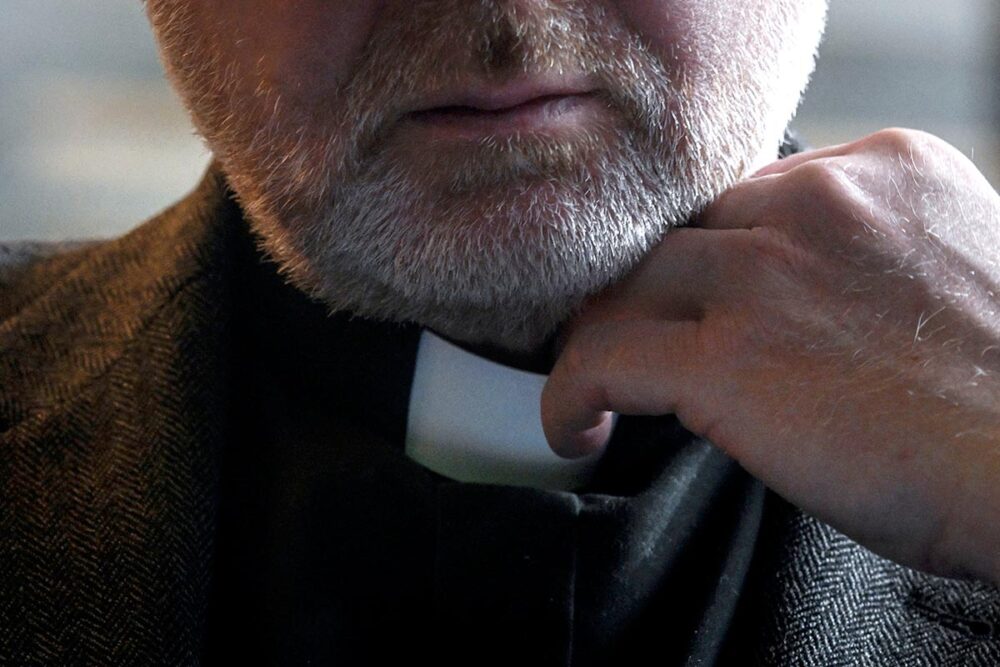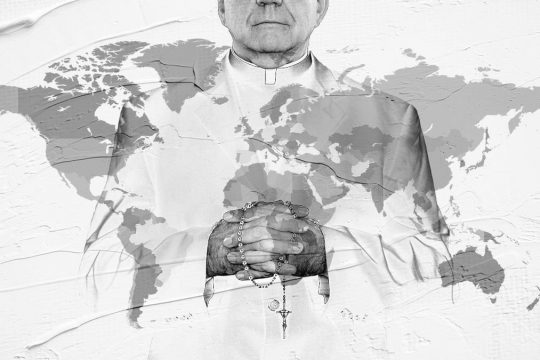In 2019, a report by the British NGO Child Rights International said Latin America was experiencing a "third wave" of revelations about abuse of minors in the Catholic Church, following the first wave in 2002 triggered by revelations in the United States newspaper Boston Globe and the wave that swept through several European countries, starting with Ireland in 2009. In this study documenting sexual abuse in the Church in Latin America, the NGO proposes that, to deal with such widespread and systematic crimes, inspiration could be drawn from "the truth commissions set up after periods of dictatorship to probe human rights violations".
While no commission of this kind yet exists on the continent, the NGO Ending Clerical Abuse (ECA) - the first transnational organisation focusing on international justice and accountability for sexual abuse in the Catholic Church - has been making the same plea since 2017. "One of the problems linked to clergy abuse is that -- and this is very common in Latin America -- the Church moves its priests to other countries to protect them. It is essential that we have independent commissions, made up of experts who understand how the Church works," explains Mexican lawyer Adalberto Méndez López, ECA founder and coordinator of legal issues. Chile and Argentina, where numerous scandals involving the Church have come to light, symbolise two of the continent's disappointed hopes, he said in an interview with Justice Info. The most damning cases concern Peru and Mexico. Relative hope has come from Bolivia.
In Europe, the most spectacular revelations of this systemic, global scourge took place in Portugal, Spain and Switzerland.
Chile
On our world map published in September 2020, we note that the office of Chile’s national prosecutor had announced that probes into sexual abuse committed or concealed by members of the Church had risen from 38 to 119 during the summer of 2018. That year, the 32 Chilean bishops submitted their resignations to Pope Francis when they were summoned to Rome. At the time, Chile was the first country in Latin America to set up an independent Church investigation commission. A total of 158 people - bishops, priests or lay people linked to the Church - are or have been under investigation for sexual abuse in Chile since the 1960s.
Since then, no progress seems to have been made, and confidence in the Church is reported to be waning in Chile, "especially as sexual abuse revelations have continued to rise after 2018. People are speaking out: more than half the complaints recorded by the Church were made between 2018 and 2019," according to an account published in the French daily La Croix.
Argentina
In November 2019, two clerics working in a specialised institute in Argentina were sentenced to 42 and 45 years in prison for sexually abusing deaf and hard-of-hearing children. In February 2020, victims travelled to Rome to request a meeting with the Pope.
In 2022, the priest Gustavo Oscar Zanchetta, bishop of the Oràn diocese from 2013 to 2017, was sentenced to four and a half years in prison for sexual abuse of two minors who were seminarians in the parish of Puerto Santa Cruz between 2009 and 2012.
Peru
In January 2018, the Vatican put Peruvian Catholic lay movement Sodalitium Christianae Vitae, under its supervision after its founder Luis Fernando Figari, a refugee in Rome, had been accused of sexual abusing minors. Four other members were suspected of sexually abusing and kidnapping 19 minors between 1975 and 2002.
The Sodalitium Christianae Vitae affair is the country's biggest sexual abuse scandal: between 1970 and the early 2000s, dozens of people, including minors, were abused within this institution. However, it was not until July 2023 that the Vatican appointed a commission of experts in the capital Lima to investigate these abuses. Archbishop of Malta Charles Scicluna and Spanish priest Jordi Bertomeu, recognised as some of the best clerical investigators of paedophile crimes in the Church, were put in charge of the inquiry.
Mexico
In 2006, the country was rocked by the case of Marcial Maciel, founder of the Legionaries of Christ, who was publicly accused of sexual abuse and ill-treatment of minors between 1956 and 1997. In 2021, following internal investigations by the Catholic Church, twelve bishops were implicated for their handling of sexual abuse cases. "In Mexico, in 2020, there was an attempt to create a truth commission to investigate all the crimes committed by the clergy, and I was the lawyer who proposed the initiative to the senators," says Adalberto Méndez López. "What happened? The government literally did everything it could to stop these commissions. The Church and politics are too intertwined in our countries; the institution has very powerful relations with governments.” It can go far, he stresses. "The former Mexican president [Andrès Manuel López Obrador] said publicly that he wouldn't fight the Church because he didn't wish to."
Bolivia
The only hope for such a commission came from Bolivia. In May 2023, in a letter addressed to Pope Francis, the Bolivian president asked that "all files, registers and information concerning allegations or facts of sexual abuse" committed in Bolivia be handed over to his country's justice system. "Nothing like this has ever been undertaken on the continent," says Méndez López.
This official request comes after revelations of abuse in the Bolivian Church by Spanish daily El Pais in April 2023. The Spanish Jesuit priest Alfonso Pedrajas, who died in 2009, was alleged to have abused more than 80 minors when he ran the John XXIII school in Cochambamba, in the centre-west of the country. Following these revelations, 35 members of the Catholic Church were reported to the Bolivian justice system by 17 alleged victims of sexual assaults, and are currently under investigation.
On 24 May 2023, the Bolivian bishops set up a National Listening Commission and a National Commission of Inquiry to shed light on the alleged cases. "We really thought that Bolivia would be what we needed in the region," says Méndez López. But according to his information, these commissions remain partial: "What I have learned recently is that the Bolivian state does not want the victims to be part of the commissions. This is unacceptable, so they will certainly not see the light of day.”
As in Peru, the Pope has sent the priest Bertomeu to report on programmes to prevent sexual abuse.
Brazil
In May 2019, Pope Francis accepted the resignation of the Brazilian bishop of Limeira, Monsignor Vilson Dias de Oliveira, who was being investigated by the Brazilian civil justice system on suspicion of covering up sexual abuse.
At the end of May 2023, a book by two Brazilian journalists on paedophilia in the Church revealed that 108 priests and Catholic leaders had faced legal proceedings in Brazil since 2000. An internal Vatican report dating from 2005 estimated that one Brazilian priest in ten was involved in cases of abuse, i.e. some 1,700 clerics.
United States
In April 2023, a report by the Maryland State Prosecutor revealed that at least 600 children had been abused by at least 150 members of the Catholic clergy between 1940 and 2002. The US justice system denounced the "complicity of the Church". This investigation into the Archdiocese of Baltimore was opened in 2018 following revelations by the Pennsylvania prosecutor that at least 1,000 children had been victims of paedophilia by more than 300 priests, covered up by the Church.
Portugal
On 13 February 2023, the Portuguese Independent Commission, commissioned by the Bishops' Conference and made up of six experts, published its report. It found that 4,815 victims had been sexually abused by members of the Portuguese Catholic Church over the past 70 years. Of the 500 testimonies collected by the Commission, 25 have been referred to the public prosecutor for investigation. Among other things, the experts recommended a change in the law that would extend the statute of limitations to 30 years after the event. On the release of this report, the president of the Bishops' Conference confirmed the creation of a support body for victims and possible financial compensation.
Spain
On 27 October 2023, the first independent Commission of Inquiry into paedophile crimes in the Spanish Catholic Church, mandated by the Spanish Parliament, revealed in its report that more than 440,000 people - including 200,000 minors - had been victims of assaults by members of the clergy between 1970 and the present day. The report is based on a survey of 8,000 people. It found that 0.6% of Spaniards aged between 18 and 90 said they had been assaulted by a member of the clergy when they were minors. While the Spanish Bishops' Conference apologised to the victims, it described as "surprising (...) the extrapolation of the data obtained (...), which does not correspond to the truth, nor does it represent all priests and members of religious orders".
Belgium
On 19 October 2023, a new commission of inquiry into sexual abuse in the Church in Belgium was set up, unanimously called for by the Flemish political parties. Thirteen years after the first parliamentary committee was set up to investigate sexual abuse in the Church, its aim was to assess the attitude of the Catholic hierarchy towards potential victims who had since been reported, and evaluate the results obtained by victims following the first report. This commission comes after a television programme was broadcast on Flemish public television revealing through dozens of testimonies the extent of sexual abuse against minors.
Switzerland
On September 12 this year, a report released in Zurich revealed 1,002 cases of sexual abuse committed by members of the Swiss Church since 1950. Commissioned by the Church, this ground-breaking pilot study was conducted by researchers at the University of Zurich. Using mainly archive material, the study identifies 921 victims of sexual abuse perpetrated by 510 perpetrators, the vast majority of whom were priests. 74% of the abuse was committed against minors and 14% against adults. The Church has announced the creation of a national body to receive and listen to victims and wants to set up an ecclesiastical criminal and disciplinary tribunal. This initial study should be extended over the next three years.








